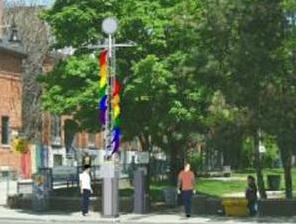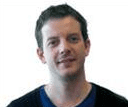While I often roll my eyes at many of the inflammatory comments left below our articles on xtra.ca, two this week gave me pause.
The first, referencing a story about residents at the intersection of Alexander and Church and their fight to keep benches off that corner, will be a familiar argument to many. The condo-dwellers there have long complained that the street is too noisy. “If you live downtown you get drug dealers, hookers, homos, gang-bangers — a cesspool of humanity basically in all of its lusciousness.”
I couldn’t have said it better. That’s why I live downtown.
The writer then encourages homeowners unhappy with the evening noise of Church St to pack up and move to Elliot Lake if they don’t like downtown life.
But the police and Councillor Kristyn Wong-Tam have done the opposite; both are looking at ways to further sanitize the area and placate the loudest voices. Indeed, as she has for many other tiny spaces, Wong-Tam has commissioned designs for this corner, including one that would turn it into a mini-golf course and another that would create a gay walk of fame.
Where is the vision in this? How can a neighbourhood be built — or improved — one corner at a time, each with a different concept?
Wong-Tam has rightly been a great advocate for neighbourhood improvement and action ahead of WorldPride 2014, when Toronto is supposed to finally become that international gay destination we’ve always imagined we are.
This type of piecemeal planning doesn’t seem the best way to get us there. Like they have on the waterfront or transit files, city officials working to improve the Church St neighbourhood are limping along haphazardly, with no vision and no backbone. Wong-Tam can host a stakeholder meeting every night for the next year, but at the end of it she surely won’t come up with a grand, exciting vision. She will end up with mini-golf on one corner, a gay walk of fame on another, a 65-storey eyesore condo on yet another and not a shopper or tourist in sight.
Which brings me to the second comment, found under a travel story featuring Berlin and referring to it as a mecca for gay tourists. One reader wonders why Toronto can’t be such a mecca. Good question.
The article describes Berlin as “a vast and diverse set of gay scenes” with “thoughtful civic amenities.” Meanwhile, “It has a well-established, multifaceted gay community, and you’ll often see same-sex affection and leathermen in full regalia alongside families and kids on bikes. It is also the location of big summer street events.”
Well, that’ll do it. So while the Church-Wellesley Village Business Improvement Area has been busy cancelling the annual Fetish Fair and trying to bring in family-friendly . . . wait . . . neighbourhood-inclusive activities, other cities get that what makes a great neighbourhood is diversity, sexual expression, street parties and civic amenities.
The BIA has also been unable to express a clear vision for the gay neighbourhood in Canada’s largest city. In trying to pander to everyone, it has appealed to no one. Indeed, its members have cancelled a popular, sexy, gay street fair that attracted tourists — the very type of event that should be ramped up in advance of WorldPride — in favour of spending almost $100,000 on two rainbow-swirl street markers.
And while it is true that improving gay life does not fall under the BIA’s mandate, turning the gay neighbourhood it serves into a more appealing destination for gay tourists can only help business.
A city that has lost its ability to embrace sex and sell itself to the world is a city that has also lost the ability to see itself as part of a diverse world (and as part of a diverse community within that world).
Somehow I cannot imagine potential international gay tourists to Toronto scanning the internet looking for a city with the best flowerpots, gayest mini-golf or prettiest rainbow street markers. No, they’re looking for the raunchiest street party, best restaurants and most diverse homo scene (see Berlin). The rest is window dressing.
Even Liz Devine, co-chair of the BIA and president of Thomas Cook Rainbow Travel, knows this. While she recently told Xtra the BIA wants to open up Toronto’s gay village to those outside the gay community, she also told The Globe and Mail what makes a great gay travel spot in the rest of the world. She calls Puerto Vallarta a “true gay destination” because it has “many gay-owned and -operated hotels, bars, restaurants and nightclubs.” Curaçao is a hot gay travel spot because of its “gay-themed events,” and Barcelona is Europe’s gay gem because of its “street musicians . . . tapas bars and DJ-fuelled nightlife.”
I hope one day Devine’s counterparts in Barcelona and Berlin will be able to say the same about Toronto.


 Why you can trust Xtra
Why you can trust Xtra


